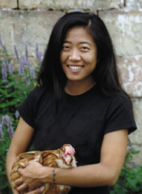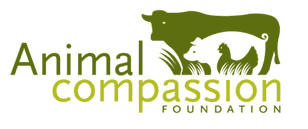HSUS Plays Chicken with Whole Foods
 Meet Miyun Park. She’s a former Vice President for Farm Animal Welfare at the Humane Society of the United States. In 2009, Park’s résumé landed her a job as Executive Director of the Global Animal Partnership (GAP), the organization administering a new 5-tier animal-welfare rating system recently unveiled by Whole Foods Market. (To see GAP’s tax returns, click here.)
Meet Miyun Park. She’s a former Vice President for Farm Animal Welfare at the Humane Society of the United States. In 2009, Park’s résumé landed her a job as Executive Director of the Global Animal Partnership (GAP), the organization administering a new 5-tier animal-welfare rating system recently unveiled by Whole Foods Market. (To see GAP’s tax returns, click here.)
To judge from glowing media reports of the new meat, dairy, and egg labeling scheme, Miyun Park sits at the nexus of the animal-welfare mainstream and America’s foodie elites. But Park and GAP aren’t exactly what they seem.
GAP is beginning to show signs of a legitimate vegan takeover, led by Park—who, as the farm-animal VP at HSUS, was crystal clear about her desire to eliminate as much livestock farming as she could.
More on that after the jump.
 The Global Animal Project was originally founded as the “Animal Compassion Foundation” in early 2005. Whole Foods unveiled the program with chairman John Mackey on its board. For the organization’s first four years of operation, the organic grocery chain was its only funder, putting more than $1.32 million into what amounted to an in-house animal welfare certification program.
The Global Animal Project was originally founded as the “Animal Compassion Foundation” in early 2005. Whole Foods unveiled the program with chairman John Mackey on its board. For the organization’s first four years of operation, the organic grocery chain was its only funder, putting more than $1.32 million into what amounted to an in-house animal welfare certification program.
In 2008 the Foundation’s name was changed to the Global Animal Partnership (GAP), and Miyun Park joined the Foundation’s board. So did former PETA “corporate affairs” consultant Steven Gross and Organic Valley CEO George Siemon. By late 2009 Humane Society of the United States CEO Wayne Pacelle was added to GAP’s board, and Miyun Park became Executive Director.
Today GAP’s Board is chaired by former Compassion In World Farming CEO Joyce D’Silva, a vegan who told England’s Ecologist magazine in 2010 that “Meat should carry a health warning.”
In 2009 Whole Foods added another $100,000 to its support for GAP, bringing the total to $1.42 million. GAP also received an anonymous gift of nearly $380,000 (passed through a donor-advised trust). An additional $6,241 came from Stefan Muth, an enigmatic organizer of Hawaiian vegan communes and medical self-diagnosis software engineer. Organic Valley provided another $5,000. So did Miyun Park herself.
Park is the only known animal activist to have worked for HSUS, PETA, and the quasi-medical “Physicians Committee” for Responsible Medicine—all three branches of the American animal-rights triumvirate. Before Park arrived at HSUS in 2005, she spent ten years as President of “Compassion Over Killing” (COK), the rag-tag Washington, DC animal liberation group where current HSUS farm-animal leaders Paul Shapiro and Josh Balk got their start.
Park and Shapiro started COK together in high school. They also co-edited COK’s newsletter The Abolitionist, which sold videotapes glorifying a FBI-designated terrorist group called the Animal Liberation Front.
Knowing Miyun Park’s history as an animal rights (not animal welfare) agitator, it’s hard to take GAP seriously in its claim to be focused merely on “continuous improvement in the welfare of animals raised for food.” It’s clear, instead, that Park is interested—as she has always been—in the abolition of animal agriculture.
In October 2006, nearly two years after Wayne Pacelle hired her as an HSUS Vice President, Park delivered some remarks as part of an “Expert Panel on Poultry” at “The Strength of Many,” a “Compassionate Living Festival” organized by the Animals and Society Institute.
You have to hear this for yourself.
Transcript (emphasis added):
For all of us, our goal is to reduce the greatest amount of suffering for the greatest number of animals. We don't want any of these animals to be raised and killed. But when we're talking about numbers like “one million slaughtered in the U.S. in a single hour,” or “48 billion killed every year around the world,” unfortunately we don't have the luxury of waiting until we have the opportunity to get rid of the entire industry.
And so because of that, a number of organizations including the Humane Society of the United States, we work on promoting veganism, and encouraging people to make daily choices that will positively impact the welfare of animals, and at the same time to reduce the greatest amount of suffering for these animals.
We have a very active cage-free campaign. Are we saying that cage-free eggs are the way to go? No, that’s not what we’re saying. But we’re saying it’s a step in the right direction, getting these birds out of cages so that maybe they can actually spread their wings.
This is the activist in charge of the Whole Foods “5-Step Animal Welfare Rating™” certification program. Park doesn’t want animals to become food, period. As the HSUS Vice President in charge of farm-animal issues, she set the organization’s “promoting veganism” agenda. For her (as with her Compassion Over Killing colleague Josh Balk), “cage free” eggs are a means to an end—the “end” being the death of the chicken farm.
Does Whole Foods know there’s a vegan in the henhouse? Will the grocery chain’s new 5-tier meat rating system wind up crowding meat out of its marketplace?
Are we the only ones who see where this is headed?
Photo: Global Animal Partnership website



